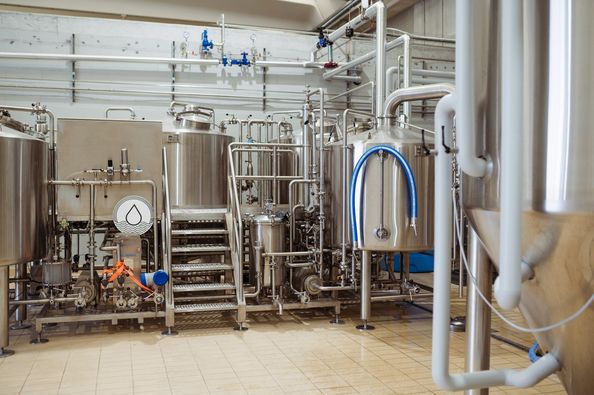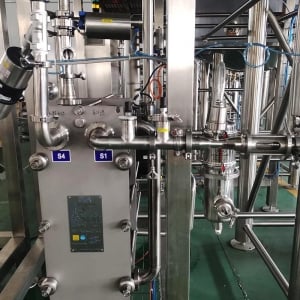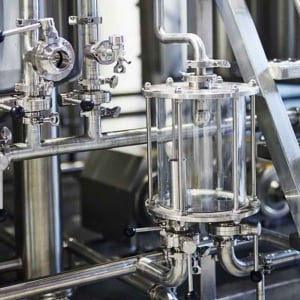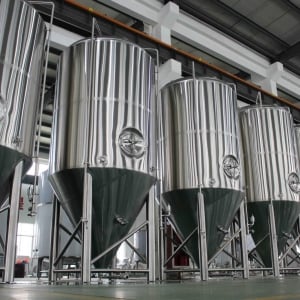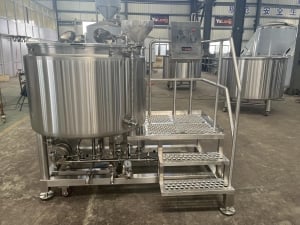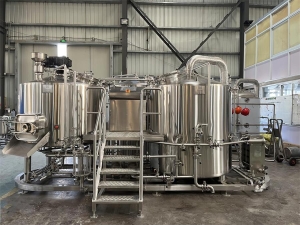Table of Contents
ToggleIntroduction
Beer brewing has a rich history, and today, the brewing industry is thriving with countless breweries producing unique and flavorful beers. For breweries looking to meet growing demands, large beer brewing equipment becomes a crucial investment. In this article, we’ll dive deep into the world of large beer brewing equipment, exploring its types, benefits, and how to choose the right equipment for your brewing needs.
Understanding Large Beer Brewing Equipment
What is Large Beer Brewing Equipment?
Large beer brewing equipment refers to the machinery and vessels used in the commercial production of beer. These systems are designed to handle substantial quantities of ingredients, making them ideal for large-scale brewing operations. Large beer brewing equipment includes various components, such as brew kettles, fermentation tanks, mash tuns, and more.
How Does Large Beer Brewing Equipment Work?
The large beer brewing process involves several stages, including milling the grains, mashing, boiling, fermentation, conditioning, and packaging. The equipment facilitates each of these steps, providing the brewmaster with precise control over the brewing process. The result is consistent and high-quality beer production.
Advantages of Large Beer Brewing Equipment
Large beer brewing equipment offers numerous advantages for breweries:
- Increased Production Capacity: Large brewing equipment allows breweries to produce significant quantities of beer, meeting market demand and business growth.
- Consistency: With precise control and automation options, large equipment ensures batch-to-batch consistency, maintaining the quality of the beer.
- Efficiency: Large equipment streamlines the brewing process, reducing the time and labor required for production.
- Potential for Innovation: The scale of large equipment opens opportunities for experimenting with different beer styles and flavors.
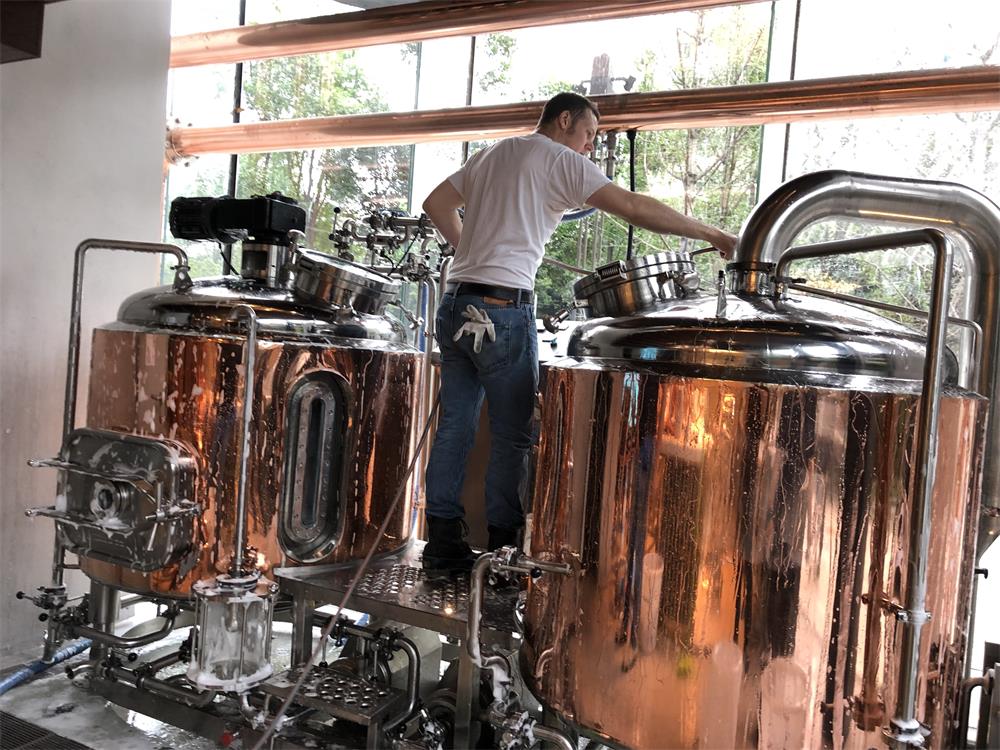
Types of Large Beer Brewing Equipment
Brew Kettles
A brew kettle is a crucial component in the brewing process where the wort is boiled, hops are added, and flavors are developed. Large breweries often use steam-powered kettles for efficient heating and boiling.
Fermentation Tanks
Fermentation tanks are where the magic of beer happens. Yeast converts sugars into alcohol and carbon dioxide, transforming the wort into beer. Large breweries use fermentation tanks with precise temperature and pressure controls.
Mash Tuns
Mash tuns are vessels where milled grains are mixed with hot water to convert starches into fermentable sugars. In large brewing setups, mash tuns can be either traditional vessels or advanced automated systems.
Wort Chillers
After boiling, the hot wort needs to be rapidly cooled to the appropriate fermentation temperature. Wort chillers, like plate or counterflow chillers, efficiently cool the wort, preventing contamination.
Bright Tanks
Bright tanks are used for beer conditioning and carbonation before packaging. These tanks allow brewers to clarify and stabilize the beer before it reaches the consumers.
Grain Mills
Grain mills are essential for large breweries to crush the grains and expose their starches for mashing. These mills come in various sizes and configurations to accommodate different production capacities.
Yeast Propagation Equipment
Large breweries require significant amounts of yeast for fermentation. Yeast propagation equipment helps multiply and maintain healthy yeast cultures for consistent fermentation.
Choosing the Right Large Beer Brewing Equipment
As the demand for craft beer grows, more breweries are investing in large beer brewing equipment to scale their production. However, choosing the right equipment is critical for success.
Production Capacity
Consider your current and future production needs when selecting large beer brewing equipment. Ensure that the system can handle your desired output without compromising on quality.
Material Quality
The quality of the equipment materials affects the final product’s taste and safety. Stainless steel is a popular choice due to its durability, ease of cleaning, and resistance to corrosion.
Heating and Cooling Options
Efficient heating and cooling mechanisms are vital for consistent brewing. Opt for equipment with advanced heating and cooling options, like steam jackets and glycol cooling systems.
Control Systems
Precise control over temperature, pressure, and other brewing parameters is essential for achieving the desired beer characteristics. Look for equipment with user-friendly and customizable control systems.
Cleaning and Maintenance
Large beer brewing equipment requires regular cleaning and maintenance to ensure optimal performance and longevity. Consider equipment that is easy to disassemble and clean.
Setting Up a Large Beer Brewing System
Before diving into large-scale brewing, breweries need to ensure they have the appropriate setup and infrastructure in place.
Location and Space Requirements
Select a location that provides ample space for the brewing equipment, storage, and potential expansion. Adequate space allows for efficient workflow and ensures compliance with safety regulations.
Water Source and Quality
Water quality directly impacts the taste and consistency of beer. Verify that your water source meets brewing standards and consider water treatment options if needed.
Power Supply
Large brewing equipment requires a stable and adequate power supply. Consult with a professional electrician to ensure your brewery has the necessary power capacity.
Safety Measures
Implement safety protocols and train staff in handling large brewing equipment. Safety should be a top priority to prevent accidents and ensure a smooth brewing process.
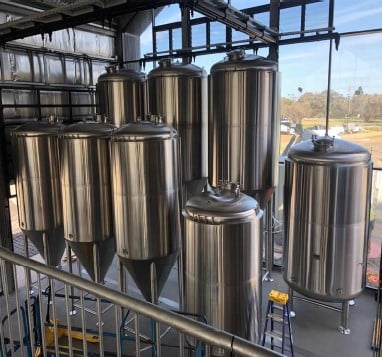
The Brewing Process with Large Beer Brewing Equipment
Step 1: Milling the Grains
The brewing process begins by milling the grains, cracking the husks to expose the starchy insides. A consistent grind ensures efficient mashing and maximum extraction of sugars.
Step 2: Mashing
In the mash tun, the milled grains are mixed with hot water, creating a mash. Enzymes present in the grains convert starches into fermentable sugars, producing a sweet liquid called wort.
Step 3: Boiling
The wort is transferred to the brew kettle, where it is boiled and hops are added for bitterness, flavor, and aroma. Boiling also sterilizes the wort, making it safe for fermentation.
Step 4: Fermentation
After boiling, the hot wort is cooled and transferred to fermentation tanks. Yeast is added, and fermentation begins, converting sugars into alcohol and carbon dioxide.
Step 5: Conditioning
Once fermentation is complete, the beer undergoes conditioning in bright tanks. During this stage, the beer clarifies, and flavors further develop, resulting in a smoother and more refined taste.
Step 6: Packaging
After conditioning, the beer is ready for packaging. Large breweries often use automated systems to fill bottles, cans, or kegs efficiently. Proper packaging ensures the beer remains fresh and maintains its quality until consumed.
Maintaining and Troubleshooting Large Beer Brewing Equipment
Cleaning and Sanitization
Regular cleaning and sanitization are crucial for preventing contamination and maintaining beer quality. Establish a cleaning schedule and use appropriate cleaning agents for each part of the brewing system.
Regular Maintenance Checks
Perform routine maintenance checks on all equipment to identify and address potential issues before they escalate. Keep spare parts on hand to minimize downtime during repairs.
Common Issues and Solutions
Be prepared to troubleshoot common issues that may arise during the brewing process, such as temperature fluctuations, leaks, or clogged pipes. Familiarize yourself with troubleshooting procedures or consult equipment manufacturers for support.
Scaling Up Your Brewing Business
Meeting Increased Demand
As demand for your beer grows, scaling up production becomes necessary. Evaluate market trends and projections to ensure you’re prepared for increased sales.
Expanding the Production Capacity
When expanding your brewery, consider the available space, equipment needs, and production goals. Gradual expansions are often more manageable and allow for smooth adjustments.
Considering Automation
Automation can streamline the brewing process, increase efficiency, and reduce labor costs. Assess the benefits of automating certain steps in your brewing process.
Conclusion
Large beer brewing equipment plays a pivotal role in the success of commercial breweries. Investing in the right equipment ensures efficient production, consistent beer quality, and the ability to meet market demands. By understanding the types of equipment available, how to choose the right system, and the brewing process involved, breweries can thrive in the competitive craft beer industry.
FAQs
- Q: Can large beer brewing equipment be customized to suit specific brewing styles?
- A: Yes, many manufacturers offer customization options to tailor large brewing equipment to the unique needs and preferences of brewers.
- Q: Are large beer brewing systems suitable for small craft breweries?
- A: While large systems are designed for high-volume production, they can be adapted for smaller breweries by adjusting batch sizes and optimizing production schedules.
- Q: What are the main factors influencing the taste of beer produced by large brewing equipment?
- A: The main factors include the quality of ingredients, brewing process parameters, and fermentation conditions.
- Q: How can I ensure the longevity of my large beer brewing equipment?
- A: Regular maintenance, proper cleaning, and using high-quality materials can contribute to the long lifespan of your brewing equipment.
- Q: Is it possible to automate the entire brewing process with large equipment?
- A: While certain steps can be automated, many brewers prefer to retain a level of manual control and involvement in the brewing process.

